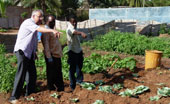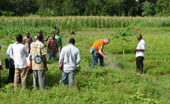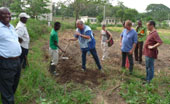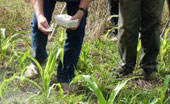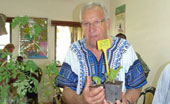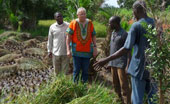

In Marcel Mézy’s wake
among Togolese farmers
Last spring, Marcel Mézy went to Togo with one of his engineers, Marie Baert, in order to set up experiments, organize a workshop and develop ties with the University of Lomé. A very enriching experience, both professionally and humanly.
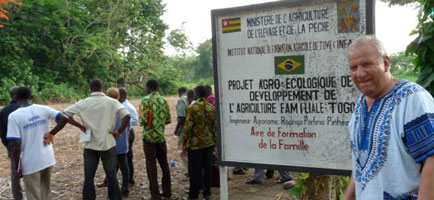
"We have many lands that are not farmed. There we need to bring back our youth who leave the countryside to be 'motorcycle-taxi' in Lomé. This process can help us curb the rural exodus."
On African soil, Marcel Mézy is a happy man. In Togo, he set up a structure to help Togolese farmers and vegetable growers control their future before it is too late. "I want to offer them the means to overcome their difficult situation thanks to my fertilization process. This is why I wish to set up life-size experiments so that they can understand its effects and learn how to use it. At 70 years of age, if I succeed in helping these poor farmers, ensuring that they take their fate into their own hands, I will have fulfilled one of my lifelong dreams. Above all, we are in a philosophical, non-financial reflection."
That month of 2012, Marcel Mézy and Marie Baert, agronomist at Mézagri, landed in Lomé to lead a workshop together with some sixty sales engineers, union leaders, vegetable grower leaders and agricultural engineers. 3AGK, the structure that represents Marcel Mézy in Togo has done things right. Those three days will be of incomparable wealth.
Zacharie Agboka, agronomist, does not hide his enthusiasm: "Marcel Mézy’s first visit here had already made a lot of noise. The Higher Agricultural Engineering School must be absolutely a support for this product. I have entrusted the whole project to the University Department of Soil Sciences. They are really interested. We must be strong and we need a very strong scientific committee."
Kofi Agbenene, mischievous farmer, goes along with him: "Our lands are blocked. We must regenerate them and I think we are at the beginning of an ambitious project. We have many lands that are not farmed. There we need to bring back our youth who leave the countryside to be 'motorcycle-taxi' in Lomé. This process can help us curb the rural exodus."
"You can be proud of what you bring to mankind"
On that Sunday morning, Lys Djamie, a Togolese television anchor, was welcoming Marcel Mézy in her live show called L'bala.
"How are you?" in Cabyé, the language of an ethnic group from northern Togo. A thirty-five minute programme during which Marcel Mézy explained tirelessly the mission he had set himself for Togo: "I have always thought that we could fertilize soils naturally. I’m really proud to be here today to help the Togolese farming community."
The presenter: "The chemical industry…so you come to steal their beefsteak?" Laughs around the table before Abraham, representative from 3AGK, concluded: "This product provides better quality seeds and will regenerate our land." The last word for Lys: "You can be proud of what you bring to mankind."
"With Marcel Mézy, I feel a great complicity"
Then trip to inland, and two hours from Lomé, first stop at Antoine Konou’s, secretary of 3AGK and manager of an experimental farm: "This process fits perfectly with my philosophy. Plants are just like infants whose mother is the land. It’s better to feed well the mother so that her milk can feed well the baby. Seeing that what is done in France has such a quick impact in Africa is something rewarding for us. The farming community mustn’t get used to chemical fertilizers. The situation is not hopeless but it’s high time to do something."
Antoine appreciated that this workshop was organized, being aware that this kind of initiative can change agricultural practices: "With Marcel Mézy, I feel a great complicity, a real will to share. It changes from many practices. Very often, the help we are granted from outside is opium for us. We fall asleep. With Marcel Mézy, on the opposite, we feel very excited."
Marcel Mézy posed with Antoine in front of the first orange tree to be treated with his process while keeping on providing advice.
Sixty participants from all over the country
On that Monday morning, there was a great excitement at the INFA (National Agricultural Training Institute) of Tové in Kpalimé, in the centre of Togo. A poster was giving the tone: "For thirty years, Europe has been using Marcel Mézy’s process. Why would Togo be deprived of it?" Some sixty women and men had come here by bus, by car, hitch-hiking, coming from the central region of Sofodé or other regions: Plateaux, Savanes, Kara or Maritime. Abraham became a presenter: "The aim of this workshop is that you take ownership of the agricultural practice with this process. It is now that we get on the bandwagon to build a bridge between agricultural scientists and farmers."
Discussions about humus, microorganisms, the workshop participants were hanging on Marcel Mézy’s every word: "I am a farmer and I don’t want to cheat on farmers. If all the farmers of the world joined hands, we wouldn’t be in that situation. I want you to be convinced that our process enables the regeneration of damaged soils." Antoine Konou went on, finding the right words to captivate his audience: "We must give the land what it needs. We must farm the land without ever drying it up. This is exactly what Marcel Mézy’s process does."
All through the afternoon, each representative of the five regions explained its current agricultural practices. Corn, onions, yam, gumbo, pineapple, rice, peppers, market gardening, all productions were scrutinized and for every variety quoted, a solution was proposed with the process. As chemical fertilizers are already used in numerous crops, the aim of this workshop was above all to find alternatives.
On Tuesday, a first collective question gave the opportunity of synthesizing on the day spent in exchanges of view. Marcel Mézy went further in his explanations: "We make a microscopic green fertilizer. We bring back organic matter into soil through microorganisms." Marcel Mézy evoked the products that are incompatible with the process, spoke at length about harmful effects of fungicides and pesticides: "I’m fighting against Monsanto that have already arrived in Africa unfortunately."
It was time for local recipes. Everyone talked about the plants he was using to manage aphids, fusarium infection and also codling moth, this devastating larva of moth. Marcel Mézy asked the 3AKG representatives to note down all these practices so that they could be outspread to all the members afterwards. Lawson, a vegetable farmer from the region of Lomé was one of the first ones to experiment the process and testified: "It has worked very well on spinach and onions. Moths did not land on spinach and I had no attacks on onions, certainly because plants are more resistant. I had a very green production as if I had used nitrogen. Moreover, there was a real improvement in taste."
Time had come to move to practice. In the fields of the INFA of Kpalimé, Marcel Mézy spent hours under a blazing sun to explain trainees how to apply the product. Marcel had the smile of a child in front of a Christmas tree: "We have made great experiments. I’m so happy to start this adventure in Africa." Farmers applauded. Marcel applauded too.
Then was the festive evening in Kpalimé. A group of women from the region of Plateaux was dancing and singing to the beat of tomtoms. Marcel went to join them and danced until exhaustion. On the following morning, he had just got to pose with each delegation before the graduation ceremony for the workshop participants. Everyone had to be leaving, some of them for a long trip before reaching their village. Three experiments would be done by region on three targeted crops and a two-hectare area. The adventure had started.
"Till the end of my life, I will be at their sides"
Way back to Lomé with, on that last day of visit, a pretty instructive meeting at the Higher Agronomy School of the University of Lomé. Its principal, Professor Gado Tchangbedji, was straight from the start: "I’m glad to know that works have started because we really feel like working with you."
After thanking him, Marcel Mézy exposed his process. The principal hoped to make the experiment start very soon: "We’re going to provide you with our stations, covering all the climate range of our country in order to understand better the behaviour of your product. Our teachers-researchers will lead targeted research on it. We must be very rigorous in order to support a submission of homologation for the process in Togo."
When it was cooler, the vegetable growers from Lomé waited for Marcel Mézy to show him their first crops with the process on onions, red beets, spinach and salads. Marcel Mézy was exhausted but so happy: "I’m realizing my dream. I’m speaking with my heart. I have the feeling of getting to the end of the tunnel and seeing the sky getting bright. I should die in Africa. The loop would be closed."
There was also Friday, a visit to paddy fields at an hour and a half drive on tracks from Lomé, then a long talk with Rémi Degboen, from the Cooperative Companies Union, potato grower.
The stay was ending. The adventure on African soil had just made a decisive step forward. The final word for Marcel Mézy: "Here I’ve found genuine people, the farmers that I really like, all with the tremendous motivation to learn. Till the end of my life, I will be at their sides."
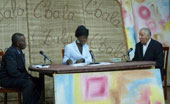
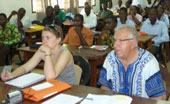
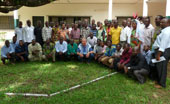
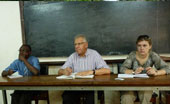
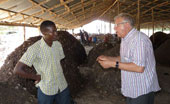
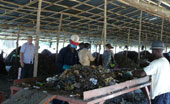
![]()

![]() Homepage -
Legal notice -
Contact us
Homepage -
Legal notice -
Contact us
The invention -
Sharing with the world’s farmers -
Marketing -
Humus production -
Carbon Storage -
Natural fertilization -
Water-saving solution -
Regenerating "dead" soils -
Solution for saline soils -
Recycling of organic waste -
Food solutions -
Biodiversity impacts
© Marcel Mézy technologies™ Environmental Solutions - 2012-2013 all rights reserved
